
|
Of the new books presented in this issue one is a record of conversations between Sri Aurobindo and Pavitra (the Frenchman Philippe Barbier Saint Hilaire) which took place more than eighty years ago. Another is a modern look at Sri Aurobindo's perspective on human motivation within the context of other theoretical perspectives in the field of psychology.
The Quest for Knowledge and Mastery, which began as Martha Orton's doctoral dissertation in the field of Integral Yoga Psychology at Sri Aurobindo Darshan: The University of Tomorrow, is a study of Sri Aurobindo's writings concentrated on revealing what Orton, a psychotherapist who has studied Sri Aurobindo's writings over many years, terms his “well-developed, original, and profound theory of motivation”. She approaches her subject with the acknowledgement that Sri Aurobindo's theory of motivation is not presented as a theory in the ordinary sense of the word, as a speculative position to be investigated, tested, or proved through intellectual analysis or empirical research, but is an expression of a spiritual knowledge and consciousness achieved through the process of inner experience and realisation. Using as source material the considerable body of Sri Aurobindo's writings on consciousness, especially in The Life Divine and The Synthesis of Yoga, she presents a detailed examination of his perspective on human motivation and shows its relation to other aspects of his vision and to other theories as established in several branches of psychological thought. This approach may well encourage other professionals in the field of psychology to take up themes for similar studies, leading modern practitioners in this rapidly changing science to discover a revelatory panorama of psychological insight and knowledge, and an extensive “view of consciousness and human potential for growth, spiritual realisation, and transformation” in the writings of Sri Aurobindo.
Conversations with Sri Aurobindo is in some ways a case study, a record of how a spiritual seeker learns to quiet the mind and open to the divine force and light from above. For nearly a year after he arrived in Pondicherry Pavitra spoke regularly with Sri Aurobindo, discussing his spiritual practices and receiving instruction in meditation. Pavitra's question and Sri Aurobindo's reply quoted below reveal a frank and open exchange that is characteristic of all the conversations recorded in the book:
|
|
NEW PUBLICATIONS
To order any book, click on the title, which will locate the book in our online catalogue. Next, add it to the shopping cart. You may then proceed to pay by credit card online.
ENGLISH |
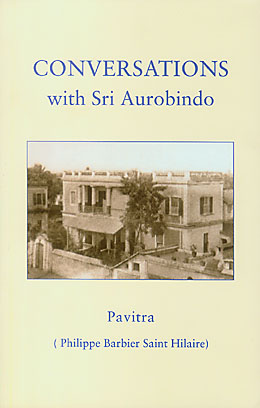 | Conversations with Sri Aurobindo
— Pavitra
ISBN: 978-81-7058-879-5
Publisher: Sri Aurobindo Ashram Publication Department, Pondicherry
Binding: Soft Cover
Pages: 165
Price: Rs 145
| From December 1925 to November 1926 Philippe Barbier Saint Hilaire, later known as Pavitra, held regular private conversations with Sri Aurobindo that centred on the practice of Yoga and Pavitra’s own sadhana. This book is a record of these conversations and some he had with the Mother toward the end of that year. It also includes several of the evening talks, in which Sri Aurobindo conversed informally with a small group of disciples, on such subjects as science and occultism which especially interested Pavitra. The book’s introduction is a talk given in 1964 by Pavitra in which he recounts his early life experiences and the events which led him to come to Pondicherry.
|
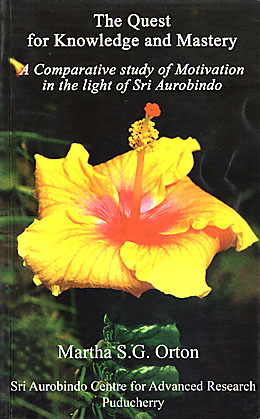 | The Quest for Knowledge and Mastery
A Comparative Study of Motivation in the Light of Sri Aurobindo
— Martha S. G. Orton
ISBN: 978-81-901891-7-0
Publisher: Sri Aurobindo Centre for Advanced Research, Pondicherry
Binding: Soft Cover
Pages: 358
Price: Rs 360
| In Part One of this study the author presents one important aspect of human motivation gleaned from a detailed study of Sri Aurobindo's writings: that man is driven by an impulsion to seek the true knowledge and mastery of life; that this motivation originates from the hidden reality of a single spiritual Self that stands behind all the activities of mind, life, and body; and that to find the conditions under which this impulse can be fulfilled in all aspects of his being is the central problem of man's life. Part Two examines how Sri Aurobindo's view relates to other theoretical perspectives of motivation in different fields of human psychology, such as the psychoanalytic, social, personality, humanistic, and transpersonal psychologies.
|
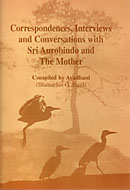 | Correspondences, Interviews and Conversations with Sri Aurobindo and The Mother
— Compiled by Avadhani (Bhanabhai G. Patel)
ISBN: 978-0-9545855-0-1
Publisher: Avadhani (Bhanabhai G. Patel) U. K.
Binding: Soft Cover
Pages: 100
Price: Rs 90
| This compilation offers a wide choice of extracts from some of the correspondences, interviews, and conversations that Sri Aurobindo and the Mother had with various sadhaks. The topics covered range from the importance of Sri Aurobindo’s Savitri, the nature of avatarhood, the right attitude in work, and the significance of dates with certain numerical combinations, to European and Indian music, wars and destruction, and India’s role in the world. The selections include material from A. B. Purani, Dyuman, Dilip Kumar Roy, K. M. Munshi, Udar Pinto, Nagin Doshi, Amal Kiran, Mona Sarkar, and others.
|
ITALIAN |
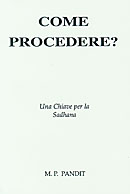 | Come Procedere?
Una Chiave per la Sadhana
— M. P. Pandit
ISBN: 978-81-7509-103-0
Publisher: Dipti Publications, Pondicherry
Binding: Soft Cover
Pages: 78
Price: Rs 60
| Italian translation of How Do I Proceed? This book presents an outline of the scope, practice, and goal of the integral Yoga of Sri Aurobindo, stressing more of its practical side than its philosophical content. The author begins with the three basic processes of the Yoga: aspiration for the Divine, rejection of all contrary movements, and surrender of one's will to the Divine Will on each level of one's being. The next chapters deal with ways one may approach the Yoga, and the final chapter discusses the key role of the psychic being in the sadhana.
|
HINDI |
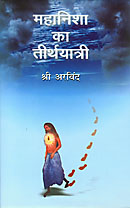 | Mahanisha ka Tirthyatri
Sri Aravinda ki 78 Kavitayen
— Sri Aravind
ISBN: 978-81-89576-05-9
Publisher: Kalpataru Prakashan, Hapur
Binding: Hard Cover
Pages: 195
Price: Rs 200
|
|
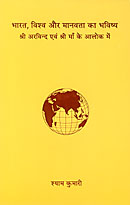 | Bharat, Vishwa aur Manavata ka Bhavishya
Sri Aravind evam Sri Ma ke Alok main
— Shyam Kumari
Publisher: Vraja Trust, Pondicherry
Binding: Soft Cover
Pages: 268
Price: Rs 200
|
|
BENGALI |
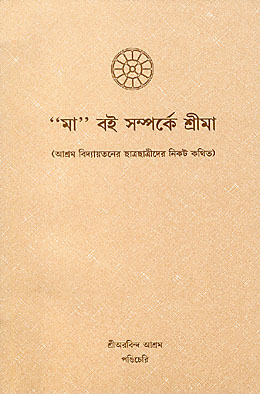 | Ma Bai Samparke Srima
— Srima
ISBN: 978-81-7058-907-5
Publisher: Sri Aurobindo Ashram Publication Department, Pondicherry
Binding: Soft Cover
Pages: 185
Price: Rs 85
| Bengali translation of The Mother by Sri Aurobindo, with the Mother's Comments This book contains The Mother by Sri Aurobindo and the Mother's spoken comments on passages from that book, made during her evening classes at the Ashram Playground. For each chapter the first set of comments were given in 1951 and the second in 1954. These comments do not form a systematic commentary on Sri Aurobindo's work, but are rather explanations of certain passages, phrases, and words. The Mother usually began the class by reading out a passage from the book, then commented on it or invited questions from those gathered around her.
|
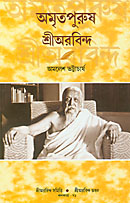 | Amritapurusha Sri Aurobindo
— Amalesh Bhattacharya
Publisher: Sri Aurobindo Samiti, Kolkata
Binding: Soft Cover
Pages: 72
Price: Rs 60
|
|
GUJARATI |
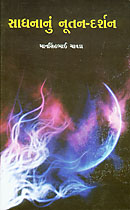 | Sadhananu Nootan-Darshan
— Mansinhbhai Chavda
Publisher: Sri Ma Sri Aurobindo Sadhana Kendra, Rajkot
Binding: Hard Cover
Pages: 368
Price: Rs 250
|
|
|
|